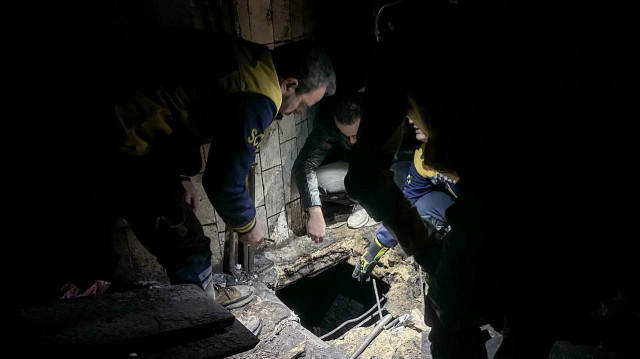
‘The world was aware' of the atrocities committed by the Assad regime, including systematic torture and starvation, says Omar Alshogre
With the fall of the brutal Assad regime, the world has been confronted with the horrifying extent of the atrocities it committed during decades of absolute power and impunity.
Systematic torture in notorious prisons, the discovery of mass graves, and decades of oppression have painted a grim picture of the Assad era. Now, as with the collapse of other dictatorships throughout history, survivors and witnesses are stepping forward to recount their harrowing experiences.
For Syrians who fled the war-torn country, emotions are mixed – hope for a brighter future interwoven with the anguish of memories from one of the darkest periods in their nation's history.
Omar Alshogre, a Syrian human rights activist and public speaker, is one of the lucky few who survived the Assad regime's brutal prison system. First arrested at the age of 15 for participating in anti-government protests, Alshogre endured years of unimaginable suffering.
Speaking with Anadolu, he reflected on the world's knowledge of the atrocities committed by the Assad regime, including systematic torture, starvation, and psychological abuse.
“The world was aware,” he said, pointing to the Caesar files, a damning collection of thousands of photographs documenting the torture and execution of detainees during the Syrian civil war.
Released in 2014, these files exposed the regime's brutal methods, prompting US sanctions, first under the Global Magnitsky Act in 2012 and later under the Caesar Syria Civilian Protection Act in 2020.
There are 53,000 pictures of people who were tortured, showing the methods of torture – from pulling out fingernails to killing people by gouging out their eyes, said Alshogre.
But the physical pain was not the only weapon used by the regime, as there was the mental torture of forcing detainees to torture each other, to kill each other, or to choose who would die the next day, he recounted.
Alshogre was eventually smuggled out of prison in 2015, fleeing to Europe as a refugee. Now based in Sweden, he has become a prominent voice for justice, serving as a key witness in legal proceedings against those responsible for crimes in Syria. He has also delivered speeches at platforms such as the UN Security Council and Harvard Law School.
“I have been dreaming about this day for nine years,” he said, referring to the recent videos of prisoners being released in Syria after the Baath regime's collapse.
“It was an extreme moment of joy and happiness … I don't think I was as happy when I was released myself.”
His own release, Alshogre added, happened in silence and secrecy, “but the people who are liberated today from the prisons, they ran out to the streets, celebrating, their hands raised.”
“It was freedom and dignity and democracy,” he said.
- Documenting atrocities
Alshogre stressed the importance of documenting the Assad regime's brutality.
It is very important for Syrians to ensure that what they went through is documented in history, so it never happens again, he said.
Teaching future generations about the atrocities of the Assad regime is vital to prevent a repeat of such horrors, he added.
After nearly 25 years in power, Bashar Assad fled to Russia on Dec. 8, following the rapid advance of Syrian rebel groups that captured Damascus and ended the Baath Party's rule of over 60 years.
Over the years, said Alshogre, the Assad regime had cultivated alliances with other dictatorships, strengthening its grip on power.
“The regime wanted us to feel hopeless, as if it would never fall,” he said.
“But I always chose to believe that the regime would fall, and that's why I kept working … I kept speaking up just like many millions of Syrians … So, it is a moment that history, hopefully, will never repeat for us in Syria. We will, hopefully, never have a dictator again.”
For those who were tortured, for those who lost their families, and for those who felt there was nothing more to live for, this is a moment of truth and justice, he added.
- Challenges, identity and the question of return
Looking ahead, Alshogre is optimistic about Syria's future, despite concerns about stability in the post-Assad era.
The Syrian people have fought for 14 years, sacrificed millions, and endured unimaginable suffering, so they will not allow just any government or president to take power, he said.
He emphasized the need for time and effort to rebuild the country and create stability but expressed confidence in Syrians' determination to secure freedom and dignity.
“Now we have a chance for freedom … The Syrian people will fight hard to make sure they get what they deserve,” he asserted.
For Syrians in exile, the fall of the Assad regime has brought both joy and difficult questions about identity and belonging.
In Stockholm, Alshogre witnessed his fellow Syrians celebrating in the streets. “It was supposed to be a protest against the Assad regime, but it became a celebration because the regime had fallen by then,” he said.
“It was a beautiful moment.”
While some Syrians are eager to return, others face complex decisions, especially those who have spent most of their lives in Europe.
For young Syrians, like Alshogre's little brothers who grew up in Sweden, “it's going to be an identity question,” he noted.
“They feel a connection to Sweden, where their friends and lives are.”
One thing that Alshogre is certain about is that the Assad regime's brutality will not be forgotten.
“The regime's atrocities will always be remembered and taught to future generations, so it never happens again,” he said.

